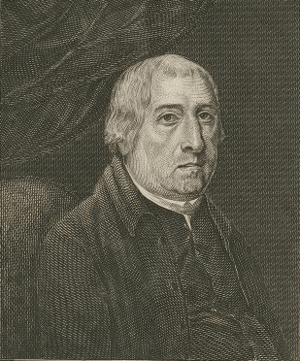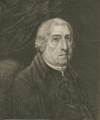Samuel Ayscough facts for kids
Quick facts for kids
Samuel Ayscough
|
|
|---|---|
 |
|
| Born | 1745 |
| Died | 1804 |
| Nationality | British |
| Occupation | Librarian |
| Known for | 'The Prince of Indexers' |
Samuel Ayscough (born 1745, died 1804) was a very skilled librarian and indexer. People even called him the "Prince of Index Makers" because he was so good at organizing information.
| Top - 0-9 A B C D E F G H I J K L M N O P Q R S T U V W X Y Z |
Early Life and Challenges
Samuel Ayscough was born in 1745 in Nottingham, England. His grandfather, William Ayscough, started a printing business there around 1710. Samuel's father, George Ayscough, continued the family business.
Sadly, Samuel's father was not good with money. He tried many risky business ideas, like trying to get gold from coal waste. Because of these bad choices, he lost almost all his family's money. He even lost the money that was supposed to be for Samuel and his sister.
When Samuel was about 17, his family was in big trouble. To help them, Samuel worked hard as a miller, managing a mill nearby. This new job also didn't go well. But then, an old friend from school, John Eamer, heard about Samuel's difficulties. John Eamer later became the Lord Mayor of London. Around 1770, John invited Samuel to London, gave him clothes, and helped him find a job. Samuel started working as an overseer for people who built roads.
Becoming a Librarian
Soon after moving to London, Samuel Ayscough got a job at a bookstore. Then, he found a position as an assistant at the British Museum. This was a big turning point for him. He started in the department that created catalogs for books and manuscripts.
Samuel's hard work and skills were quickly noticed. He received a small pay raise. In his free time, he also helped organize private libraries for other people. With this extra money and more help from his friend John Eamer, Samuel was able to bring his father to London. He took care of his father until he passed away in 1783.
Creating Important Catalogs
Samuel Ayscough became famous for his amazing work as an indexer. An indexer creates detailed lists and guides to help people find information in books or collections.
In 1780, he began working on a huge catalog of manuscripts at the British Museum. These were old handwritten documents that hadn't been properly described yet. He finished this massive project in just two years, and it was published in 1782. The catalog filled two large books and had over 20,000 separate entries. He looked at each manuscript carefully to describe it. This work made it much easier for people to find and use these important historical documents.
In 1785, after applying for different jobs for 15 years, Samuel was finally appointed as an assistant librarian at the museum. He also wanted to become a priest. He managed to do so, and served as a priest in Normanton on Soar and later in London.
Indexing Famous Publications
Samuel Ayscough continued to create many useful indexes:
- In 1786, he made an index for the first 70 volumes of the Monthly Review, a well-known magazine. This index helped people find articles by subject and by name.
- In 1787, he helped create the main catalog of books for the British Museum.
- One of his most famous works was the index for the Gentleman's Magazine (1731–1786). This index, published in 1789, helped historians find essays, poems, and names mentioned in the magazine. However, it sometimes made it hard to tell people with common names apart.
Shakespeare's First Index
In 1790, Samuel Ayscough created the very first concordance for William Shakespeare's plays. A concordance is like a super-detailed index that lists every important word used in a text. It shows where each word appears, in which play, and even the exact line.
This index was a huge help for people studying Shakespeare. Before Samuel's work, there was no easy way to find specific words or phrases in Shakespeare's plays. He made it possible to quickly look up any word and see how Shakespeare used it.
Later Life and Legacy
Samuel Ayscough was chosen to give the Fairchild lectures, which were sermons about "The Wonderful Works of God in the Creation." He gave these lectures every year from 1790 until 1804.
He also worked on a massive catalog of old rolls and charters (important historical documents) at the British Museum. This catalog filled three large books and listed about 16,000 documents. He worked on this project for five years, from 1787 to 1792. This catalog is still used today!
About a year before he passed away, Samuel became the vicar (a type of priest) of Cudham in Kent. Even though he had his job at the museum, he traveled 17 miles every Saturday to lead services and returned on Monday. He often visited the local workhouse to read prayers.
Samuel Ayscough died on October 30, 1804, at the British Museum. He was buried in London.
His Impact
Samuel Ayscough was known as the "Prince of Index Makers" because of his incredible skill and hard work. He created many important indexes and catalogs that made it much easier for people to find information. Even though he had a difficult start in life and didn't have a perfect education, he became very knowledgeable about history, old documents, and books.
He was known for being a kind and helpful person. Students at the British Museum found him to be a great help. He was also described as a tall, friendly man who enjoyed showing visitors around the museum. His dedication to organizing knowledge left a lasting impact on how information is accessed and studied.
Works by Samuel Ayscough
Samuel Ayscough published many important works, including:
- A Catalogue of the MSS. preserved in the British Museum hitherto undescribed... (1782) – This was his big catalog of unlisted manuscripts.
- Remarks on the Letters from an American Farmer... (1783) – A pamphlet he wrote anonymously.
- A General Index to the Monthly Review from its commencement to the end of the 70th volume (1786) – An index for a popular magazine.
- A General Index to the first fifty-six volumes of the Gentleman's Magazine... (1789) – His famous index for the Gentleman's Magazine.
- An Index to the remarkable words and passages made use of by Shakespeare... (1790) – The first concordance for Shakespeare's plays.
- A general index to the first 20 volumes of the British Critic... (1804) – Another index for a literary review.
Images for kids
 | Valerie Thomas |
 | Frederick McKinley Jones |
 | George Edward Alcorn Jr. |
 | Thomas Mensah |


